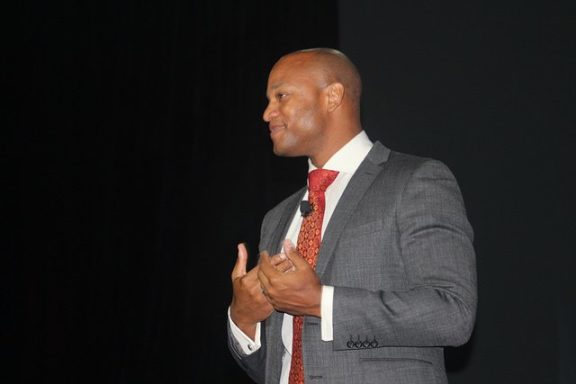
April 25, 2017; New York Times
The high-profile Robin Hood Foundation (RHF), where the board itself represents many of the deep pockets on Wall Street, has named a new CEO. The foundation, which famously addresses poverty in New York City, will announce today that author Wes Moore will take the helm full time as of this summer.
Moore was raised in the Bronx and says that his experience in those formative years informs his beliefs about philanthropy and poverty. “Who I fight for stays consistent,” Mr. Moore said. “The people I fight for, and those that Robin Hood will continue to fight for, are those who have been frequently left behind. It’s the underserved, the under-resourced. It’s the people we are having conversations about, and not having conversations with.”
The 38-year-old Moore is an Army veteran, a graduate from Johns Hopkins University, and an Oxford Rhodes Scholar. He has spent six years in finance, written four books, and founded a nonprofit, BridgeEdU, which he currently leads.
Sign up for our free newsletters
Subscribe to NPQ's newsletters to have our top stories delivered directly to your inbox.
By signing up, you agree to our privacy policy and terms of use, and to receive messages from NPQ and our partners.
The RHF does not operate without controversy. Nearly 30 years old, the Robin Hood Foundation has raised $2.5 billion from individuals and other foundations, but the donors it is most closely identified with are hedge fund folks. Rick Cohen wrote about the cognitive dissonance in the wealth at the core of the operation in 2015. He was covering a report issued by a group called The Hedge Clippers when he wrote, “Annually, the Robin Hood Foundation holds a gala fund-raising dinner that generates some $50 million for its anti-poverty programs.”
But the Clippers have an analysis that makes the $50 million look cheap compared to what the hedge fund leaders take, they say, from the economy:
- Two of Jones’s deputies at the Foundation, the Clippers say, oversee the Managed Funds Association, the hedge funds’ lobbying arm.
- The foundation demands that nonprofits do a great deal of data collection, what it calls “relentless monetization,” but the transparency that the foundation demands of its grantees is met by an opaqueness bout its own metrics and impacts.
- An analysis of the foundation’s performance against the core of its mission would suggest that it has fallen short: Though committing to end poverty in New York City, the poverty rate has increased in New York City from 20 percent in 1990 to 21.2 percent in 2012, roughly the two decades that the Robin Hood Foundation has been in existence.
- The cumulative wealth of the Robin Hood Foundation’s hedge fund billionaires increased from $85.3 billion in 2008 to $164.36 billion in 2012, an increase of 93 percent, though hedge fund manager David Tepper saw his wealth increase from $1.8 billion to $10.4 billion, a mere 478 percent increase.
- Jones and other hedge fund moguls, the Hedge Clippers say, have vigorously advocated on tax policies, particularly to protect the “carried interest tax loophole,” meaning that hedge fund managers’ income is treated in tax terms as capital gains (taxed at 20 percent) rather than as ordinary income (which would have been taxed at 39.6 percent.
- Although the foundation makes grants to support safety net programs, the foundation’s board members and key funders are actively involved with groups trying to cut back on the safety net, such as three Robin Hood people on the Manhattan Institute board of directors.
Moore will be taking over from Reynold Levy, who previously ran Lincoln Center and has been acting CEO at the foundation since David Saltzman left in 2015 after 27 years of service.—Ruth McCambridge












